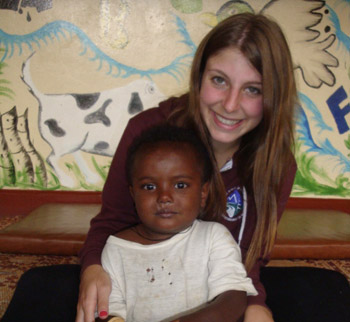When Tal Cantor spent three months in Gondar, Ethiopia, this summer, it changed her life.
“Working in a clinic where illness is concentrated, sickness is in your face, it’s a very extreme experience,” she said.
Cantor volunteered at the Mother Teresa Clinic, which treats people who are gravely ill. Although she has volunteered at hospitals in Montreal, she said she wasn’t prepared for what she would see on her first tour of the hospital. As soon as she reached the children’s ward, she cried.
“You see how physically disabled they were,” she said. “If they were somewhere more privileged, it would have never gotten to that point. They would be in a better physical shape, better emotional shape.”
It was the Jewish Agency’s Project Tikkun Empowerment Network (TEN) that brought Cantor to Gondar. This new program takes people aged 20 to 30, and brings them to impoverished countries to volunteer in the communities.
Although Cantor had never been to Africa, her father has been involved in bringing Ethiopian Jews to Israel, and her sister volunteered in Ethiopia last summer. Her mother works with adults with special needs.
“It was just a combination of my upbringing, my interest in schools,” said the McGill University environmental-science major. “You learn a lot in school but when you get a first-hand experience, it enriches your education even more.”
When the group arrived, they were given several options of how they would contribute to the society. After seeing the sick children, Cantor knew that’s where she wanted to be.
She said that initially her attitude toward the clinic was negative. She wondered why the people there were not getting the proper care they so desperately needed. But as she experienced life in Gondar, and particularly in the hospital, that all changed.
Everybody in the hospital helped one another, and did the best they could, she said. “That place wasn’t a bad place to be. It was a great place to be.”
Despite being so far away from home, Cantor found the Jewish community in Gondar to be rather familiar to her.
“They’re taught Hebrew and the prayers,” she said, adding that it’s pretty much just like any other Jewish school, and the city even has its own community centre. “They aren’t any different than we are. They just live in a different country.”
Still, she described it as a bit of a culture shock to hear the little kids speaking Hebrew.
Another moment of culture shock came when she was distributing food from the U.S. Agency for International Development. Typically, this agency brings food to Gondar twice monthly.
She said she remembers seeing a delivery of soy-enriched flour. A little boy came up to the flour station, put his hand in, and just ate it.
“That’s overwhelming in itself,” she said. “You see people who don’t have the options we have. They’re literally dependent on others to get a meal. You see people leaving with bags of food, and you don’t know how long they’re travelling with those bags on their back.”
This sight changed her view of western society.
“I remember one woman carrying the bag on her head. And here [in Canada], people complain that their knapsacks are too heavy. How can they even say that?” she said. “These are people who are blind, and these are people who are crippled. Their hope is to survive the day, and their hope is to feed their families.”
Cantor left her mark on the community through the building of a sustainable soccer field. Its sustainability means it was built using recycled materials, and nothing was cut down in order to build it.
“It is important to be culturally humble and to use materials that they have around their surrounding environment,” she said. Therefore, with the help of a translator, Cantor teamed up with workers from the clinic to build the goal posts out of wood that was lying around the compound.
She created and designed the goal posts, and a man weaved rope from bags left over from a food-distribution day.
Painting is very helpful for many of the children who have physical and developmental special needs, she said, so one day, once the goal posts were set up, she took the kids out to paint them.
“By painting they were able to make use of the muscles in their fingers, arms and hands, all the while exploring their creative capacities,” she said.
“Oftentimes, people come into these clinics from around the world, and they bring electronics and things they think are cool for these people to have,” she said. “But you’re going into another culture. You’re a guest in their world.” You can’t just bring things in and then leave, taking away these new resources, she added.
Cantor said she recommends the program to everybody. But when they sign up, they should know the Project TEN trip is different from many other volunteer programs in that it’s a longer experience in the country.
When people do short trips to Africa to build a school, it doesn’t support the community, she said. It creates a society that relies on external sources, waiting for the next group from the western world to drop in and build something else for them.
“It’s really easy for someone who doesn’t know about the culture to think they’re going to be helpful,” she said, “but you have to be humble about how to approach situations.”
In the end, Cantor, who is studying to become a doctor, said the program changed her life.
“If I have the honour of practising medicine, I want to give back to the Ethiopian culture,” she said. “It’s such a beautiful culture. The people there are so warm, and they have incredible stories. It was really a privilege to work there.”
To find out more about Project TEN, visit tenprogram.org.
